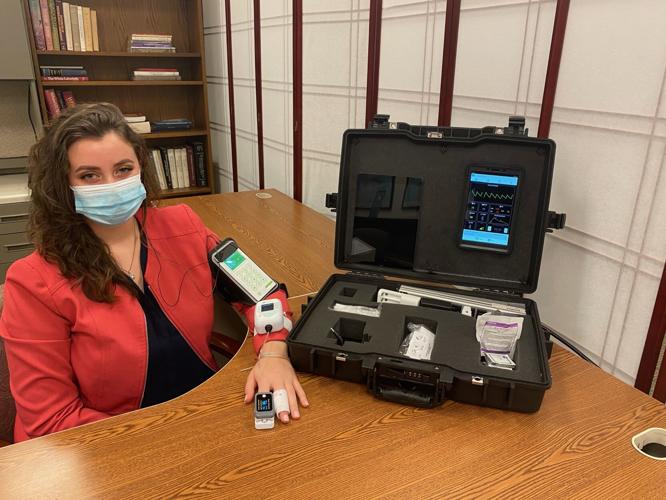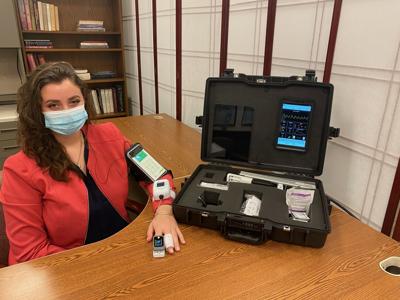More COVID-19 cases and research have meant a greater understanding of the virus' effects.
Charleston-area health experts are now looking to add to the growing knowledge with a study around coronavirus and the brain.
"It actually is directly in the brain," said Dr. Mark George, a neuroscience and psychiatry professor with the Medical University of South Carolina. "We know the virus is in there."
MUSC is looking for participants in a study to learn about the relationship between COVID-19 and brain stimulation. The goal is to gain information that will illuminate more on what health experts are referring to as neuroCOVID.
The entire study will be done using a remote telemedicine approach.
"I think it's important to understand it," George said.
Some of the symptoms around the coronavirus include shortness of breath, fever, cough and muscle aches. Researchers also have discovered that in some cases, the virus will have some aftereffects.
Continued lung and heart problems have been associated with recovery from coronavirus. Fatigue, insomnia, depression, anxiety, loss of smell and vertigo have been found in some cases as well. This is the neuroCOVID phase.
A study published in the Lancet Psychiatry Journal earlier in November found that one in five COVID-19 patients experience at least one or more of these psychiatric disorders.
"So it's not a rare event," George said.
Dr. Igor Koralnik, chief of neuro-infectious disease at Northwestern Medicine in Chicago, told The New York Times there are thousands of people who are dealing with memory loss and brain fog after having COVID-19.
“The impact on the workforce that’s affected is going to be significant," he said.
The initial loss-of-smell symptom was a big indicator that COVID-19 had an impact on the brain, George said.
The term neuroCOVID emerged earlier in the summer to label that brain effect, he said.
MUSC's new study involves the stimulation of an area of the body called the vagus nerve. It connects the brain to other parts of the body. It can signal to the body to relax or de-stress when stimulated.
The nerve is also long and influences factors such as heart rate, digestive function and breathing. All this allows it to have a significant impact on mental health, experts say.
Stimulating the nerve is also a method of treatment that is typically used in patients with epilepsy or people with depression who have exhausted all other treatment options.
MUSC researchers are looking for 20 to 30 participants who have experienced neuroCOVID symptoms. They will then go through a noninvasive vagus nerve stimulation technique.
Researchers will then determine if the process will reduce inflammation in the nerve and potentially cause the symptoms to go away.
The research project was organized by a partnership with George; Bashar Badran, an MUSC assistant professor and vagus nerve stimulation therapy researcher; and Steve Kautz, director of MUSC's Center of Biomedical Research Excellence in Stroke Recovery.
What makes the new study innovative is the stimulation technique, Badran said. Participants will be mailed a study kit that includes a stimulation device and tablets that report vital signs, including blood pressure and heart rate, according to researchers.
The stimulation device involves participants placing an earbud around their ear.
"They're like stickers," Badran said.

Researchers have learned that one in five COVID-19 patients will experience symptoms including anxiety, fatigue, depression and vertigo. Researchers are referring to this phase of symptoms as neuroCOVID. Lauren Petracca/Staff
Those earbuds are connected to a stimulator that will send small electric impulses to the vagus nerve through the patient's ear.
Participants will go through two one-hour sessions of stimulations a day for up to four weeks. During the entire hour, Badran said patients can do things like just sitting in a chair, watching television or knitting.
He said it just feels like a warm, tingling sensation in the ear. Some patients even forget they're receiving the electric impulses, he said
“It’s not painful at all," he said.
What makes this method of stimulation so innovative is what patients would have to do if the earbuds were not an option.
Stimulating the vagus nerve sometimes involves undergoing surgery to have an implant placed, Badran said.
It's an outpatient procedure with a one- to two-week recovery period. Patients would then have to come and see a trained physician to get the implant programmed and go through the nerve stimulation.
It's also more expensive and time-consuming, Badran said.
The earbud stimulation that will be used in the neuroCOVID study doesn't require participants to leave their homes at all. The remote telemedicine study is open to anyone who has experienced neuroCOVID symptoms.
Those interested in enrolling can contact Sarah Huffman at 843-792-8672 or by email at huffmans@musc.edu.
George and others say research like this is important because it helps patients further answer questions about their recovery.
"If the virus is actually still in your brain, you can’t just muscle through," he said.
If the study goes well, researchers are hoping to conduct additional studies about the simulation that will one day potentially add to the list of treatments for coronavirus.

MUSC research staff members, Morgan Dancy (left) and Sarah Huffman will help in coordinating the university's new study to learn more about COVID-19's relationship with the brain. Those who have experienced COVID-19 aftereffects such as depression, anxiety and vertigo are encouraged to participate. Provided
It's too early to tell if COVID-19 will have any long-term effects on the brain, George said. But he says he wouldn't be surprised if there are people with long-term issues. More early research done around COVID-19 and the brain will be helpful in the long run, he said.
“So many people have gotten so discouraged with this," he said. “I’m just excited that we have science that we can throw at this problem.”













